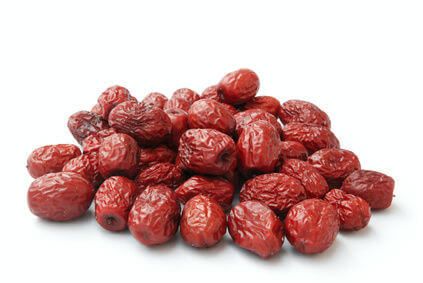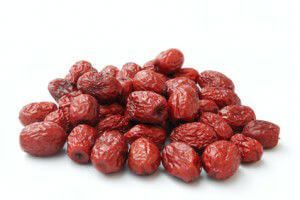
Jujubes – the fruit, NOT the candy – are relatively unknown in the west, although they have been cultivated for over 4,000 years in China. They are notably high in vitamin C, and are often featured in a number of traditional Asian remedies.
A jujube is a small, oblong tree fruit with a single stone inside. It starts out light green, then turns reddish as it ripens. Other names for jujubes include Chinese dates and red dates, however, their taste resembles apples more than actual dates. They are crispy and have edible skin.
Some varieties of jujubes, including Li, Sherwood, Sugar Cane and Honey Jar, are bred specifically to be eaten fresh. Other varieties, such as Shanxi Li and Lang, are optimal for drying. Jujubes can also be picked, made into preserves, subbed in for apples or dates in recipes (especially dried) or brewed into tea.
Jujube trees are very hardy and tolerant, grow well even in drought and can withstand spring frosts. They produce the best fruit in long, dry, hot summers, and therefore flourish in California, Texas and across the southwestern United States. They do require decent soil drainage, but are able to survive in a wide range of soil acidity levels. The fruit is ripe and in season in the fall.
The immune-boosting power of jujubes centers around their vitamin C content – they contain about 20 times more vitamin C than any citrus fruit. Jujubes also contain calcium, copper, iron, magnesium, manganese, potassium and phosphorus. These vitamins and minerals combined make a cup of tea that delivers a serious punch to a cold or respiratory infection, among a range of other ailments.
 Jujubes also contain phytonutrients known as flavonoids. Eight different flavonoids have been isolated in jujubes. One of these flavonoids, apigenin, is rich in antioxidant and anti-inflammatory properties, which could help reduce the risk of a number of chronic ailments, including digestive dysfunction, allergies, liver problems and even cancers.
Jujubes also contain phytonutrients known as flavonoids. Eight different flavonoids have been isolated in jujubes. One of these flavonoids, apigenin, is rich in antioxidant and anti-inflammatory properties, which could help reduce the risk of a number of chronic ailments, including digestive dysfunction, allergies, liver problems and even cancers.
Two of the other flavonoids found in jujubes, spinosin and swertish, possess sedative characteristics, which makes sense, as jujube seeds have been part of traditional Chinese remedies for insomnia and anxiety for many generations.
Knowles Ryerson, author of the book California Fruits, once wrote, “the jujube asks less and gives more abundantly of its fruits than almost any other tree.” All the more reason to give these sweet little fruits a try.
-The Alternative Daily
Sources:
http://www.cuesa.org/food/jujubes
http://foodfacts.mercola.com/jujubes.html
https://aggie-horticulture.tamu.edu/fruit-nut/fact-sheets/jujube/

